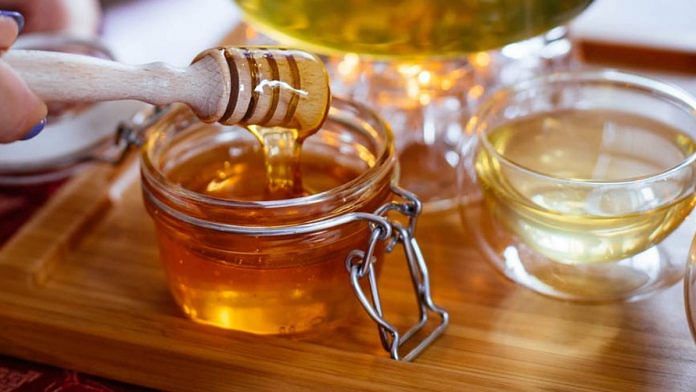New Delhi: India’s food standard regulator, the Food Safety and Standards Authority of India (FSSAI) has started work on its pan-nation drive to collect samples of honey and get them tested for adulteration, ThePrint learnt.
The regulator also brought in the Pune-based Central Bee Research and Training Institute (CBRTI) for testing the honey samples. Further, it also plans to ask manufacturers such as Dabur, Patanjali and Emami Zandu, to submit their test results of their product samples.
The move has been triggered by the findings of a study, conducted by the Centre for Science and Environment (CSE), that state that several brands are selling honey mixed with Chinese sugar syrups.
“An institutional study is being commissioned to take samples from all over the country and get them tested. The data that becomes available will be presented before concerned scientific panels and necessary amendments in thresholds, if needed, will be carried out,” Arun Singhal, chief executive officer of FSSAI told ThePrint in an exclusive interview.
“We need a large data set of several numbers of samples (of Indian honey) because the aim is to conduct the examination for collecting evidence. To get a huge number of samples, FSSAI has contacted CBRTI and all India manufacturers of honey to provide test result data available with them.”
Moreover, FSSAI has requested the Ministry of Agriculture and National Bee Board (NBB) to inform them “if any other test methods are available to reliably detect addition of fructose and glucose to honey”.
“FSSAI has issued instructions to customs and import officials to make end-use declaration of all kinds of sugar syrups mandatory, at the time of import,” the CEO added, saying, “The best method to rule out any adulteration of honey is to develop a traceability network.”
In the food business, a traceability network gives the ability to track food items through all stages of production, processing and distribution (including imports and retail) to quickly find the stage of adulteration and culprits.
“The Ministry of Agriculture is already working on this aspect and has been requested to expedite this,” Singhal said.
Also read: The bee, not the brand — India needs to bet its money on the right honey
Review of CSE study
The FSSAI, in December, had announced that it will review the findings of the CSE study and improve its systems accordingly.
Talking about the review, Singhal said, “The sample called ‘all pass’ syrup provided by CSE and also the samples collected from the Indian firms situated in Jaspur, Uttarakhand have been analysed by FSSAI.
“Test reports suggest that this syrup is a mixture of fructose and glucose. Both of these are naturally found in honey and normally constitute around 70 per cent of the mass of honey.
“But further addition of fructose-glucose syrup to honey would adversely impact pollen count, diastase activity, proline level, and protein honey isotope ratio. Isotope ratio tests have been introduced in the recent past and are not prescribed anywhere else in the world. The CSE investigation has underscored the need to critically examine the threshold levels prescribed in these tests,” Singhal explained.
In December, the FSSAI had again issued directions to food safety commissioners of all states to enhance surveillance, sampling and enforcement to check the use of sugar syrups in honey. A similar reminder was sent in June 2020.
Also read: ‘Food-o-copeia’ — India’s plan to boost corporate compliance of food standards
Testing standards differ for export & domestic honey
According to the CSE study, the Government of India in February 2020 had mandated that all honey meant for export will go through the nuclear magnetic resonance (NMR) test.
The NMR test is an advanced all-round testing parameter for scanning quality, adulteration and authenticity of honey.
“It has to be noted that no regulator in the world has mandated NMR testing. Testing through NMR is useful for establishing the origin and authenticity of mono-floral honey which is demanded by some users,” Singhal said, adding that the “Export Inspection Council (EIC), therefore, has mandated NMR for exports to the United States only since buyers’ demand NMR testing there”.
“The food authority had already made the Specific Marker for Rice syrup (SMR) test mandatory as it is ‘a more focused test’ to detect adulteration of rice syrup in honey and companies should comply with all domestic testing standards,” he said.
Also read: To tackle anaemia, Modi govt plans to make fortification of rice mandatory in next 3 years




I personally being a Beekeeper feel good about awareness spread because of CSE study.
Our Indian standards are very low .
No govt agency in existence for purchase of Honey directly from beekeepers.
Why so late? Why not immediately?
It’s already been a month.
By this time, all companies might have corrected their products.
Fake news,not authorized. This is to defame PATANJALI, DABUR companies etc
Fssai has been overlooking . It’s been a while and hand in gloves situation. Not only honey, take other areas, milk etc. Everything is adulterated.
The results of FSSAI test may also publish so as to know the public to take right brand of honey